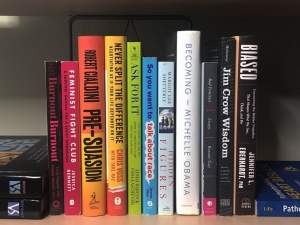Hannah Moshontz becomes first P&N student to defend PhD dissertation remotely

Hannah Moshontz reflects on the experience of defending her PhD dissertation remotely on March 18, 2020. Moshontz is the first student in the department to do so, with great success! Congratulations, Dr. Moshontz!
What was the process of defending your dissertation remotely?
It worked a lot like a normal defense: I gave a 40 minute talk to a public audience, and then, with just the committee present, I answered several rounds of questions about the dissertation. The committee went into a separate breakout room to evaluate me, and then returned to tell me I passed and offer congratulations. I then went into a different Zoom meeting where my friends were waiting to celebrate with me. The entire defense process lasted just about two hours, which is on the shorter side of typical.
Were there any aspects to presenting remotely that you found advantageous?
There were a few silver linings to having a remote defense, in addition to the obvious benefit of allowing me and my committee members to stay safe and contribute to keeping others in our community safe by staying home. Having a remote defense made it possible for people far away to watch the talk, including my Dad who tuned in from his living room in Oregon! In total, about 20 people tuned in in addition to my committee members.
Were there challenges that arose by not presenting in person?
This set up preserved many characteristic aspects of defenses: getting to share my work beyond my committee, that moment of waiting alone while the committee deliberates, and being called “Dr. Moshontz” excessively by friends afterwards.
The thing I missed most was being able to see the audience during the talk! I could only see three people in a small window while I presented. I missed being able to see people nodding or looking skeptical or looking confused! Other than not being able to see the audience, it felt very similar to a normal talk. I was lucky to experience no glitches or technology issues.
What advice would you give to other students preparing to defend via Zoom?
Here are some tips for other students who are planning to remotely defend their dissertations from home:
- Set up the Zoom meeting in advance. That will allow you to create the settings you want, and will make it possible for the link to be included in the defense announcement. Send the link to friends or family if you’d like to invite them to watch!
- If you have any friends or family who are not familiar with zoom, you can have them test the link a few days before and “meet them” there so you can answer questions they have about how to exit the call, turn their video on or off, and mute or unmute themselves.
- Coordinate with your committee chair before about how everything will work. My committee chair, Beth Marsh, was really involved in making sure that everything on the Zoom call was set up well. We made sure that our settings were as we wanted: people were muted by default, for example, and she had “host” authority so she could move herself and the other committee members into the breakout room for deliberation.
- Practice your set up before hand (ask a friend to get on a Zoom call with you, and make sure that they can see the slides, see you, and hear you). If you’d like to have presenter view on your slides, you’ll need a dual monitor. Try to do this around the same time of day as your presentation, so that you can learn if you’ll have glare in the frame or in your eyes.
- Do some planning around your internet connection. If possible, use ethernet. Have a backup plan if your internet goes out. I sent my advisor my talk slides, and we had planned that if I lost internet, he would show the slides for me while I called in on my phone.
- Dress up as if it were a normal defense. (but feel free to skip the uncomfortable shoes because nobody will see your feet!)
- Use headphones or a headset during the presentation to help reduce background noise.
- At the beginning of the defense, ask everyone to stay muted on the call and request that people use the “hand raise” feature (ctrl+Y) if they have questions.
- Ask your friends to set up a party room afterwards, and set the permissions so that anyone can enter (even if the host is not there!)
- Find ways to relax and celebrate yourself afterwards! If it’s safe and possible, get yourself flowers or a special food and/or drink item (like the traditional cake and champagne). Take the afternoon off and do something you enjoy.




